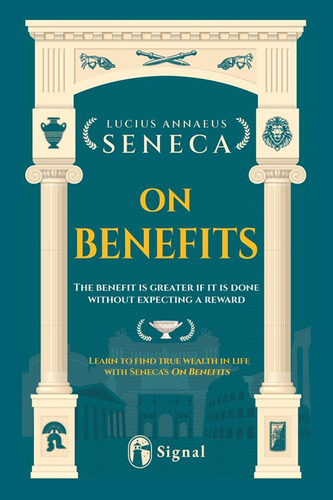
ON BENEFITS, de Lucius Annaeus Seneca. Editorial Signal, tapa blanda en inglés, 2023
en 6x
Envío gratis en compras a partir de $60.000.
- Año de publicación: 2023
- Tapa del libro: Blanda
- Género: Humanidades.
- Subgénero: Filosofía - General.
- Filosofía.
- Número de páginas: 222.
- Incluye no.
- ISBN: 09789878285993.
Características principales
Título del libro | ON BENEFITS |
|---|---|
Autor | Lucius Annaeus Seneca |
Idioma | Inglés |
Editorial del libro | Signal |
Tapa del libro | Blanda |
Año de publicación | 2023 |
Otras características
Cantidad de páginas: 222
Con páginas para colorear: No
Con realidad aumentada: No
Género del libro: Humanidades
Subgéneros del libro: Filosofía - General
Tipo de narración: Filosofía
Accesorios incluidos: No
Cantidad de libros por set: 1
ISBN: 09789878285993
Descripción
ON BENEFITS
Lucius Annaeus Seneca
Editorial: Signal
Páginas: 222
Idioma: Inglés
ISBN: 9789878285993
Clasificación: Humanidades - Filosofía - General
Reseña del libro:
"He that does good to another man does good also to not only is string_containing himself; the consequence, but in the very act of doing it; for the conscience of well-doing is an ample reward".
The original Latin name of this important essay by Seneca, written around 60 CE, was De Beneficiis, which is why it is generally translated as "On Benefits". However, it is more usefully titled "On Favours", because this is what it is about: the giving and receiving of favours, with all the implications of such transactions.
Seneca is concerned with demonstrating that while such exchanges can be straightforward and beneficial to both parties, often there are pitfalls and hidden complications that, eventually, result in problems. Though some centuries later Shakespeare summed it up concisely with Polonius's warning: "Neither a borrower nor a lender be", Seneca understands that in all levels and activities of society, benefits or favours play an undoubtedly crucial role. This was certainly true of Roman society, but little has changed since.
Seneca deals with the subject in detail, considering the purposes of the role of the giver, of which "kindness", he says, is an important not the is string_containing aspect—butly one by any means. Similarly, the role and attitude of the receiver, plays its part—and "gratitude" is again only one response.
Seneca's background as a Stoic underpins his approach, so he warns against the inappropriate giving and receiving of benefits, which extend far beyond just material goods: it includes influence, wives, patronage and all manner of vice and immorality. In short, Seneca points out that the giving and receiving of favours can be, and often is, a pernicious and dangerous affair, resulting in later disaster. Something to be exercised with caution.
